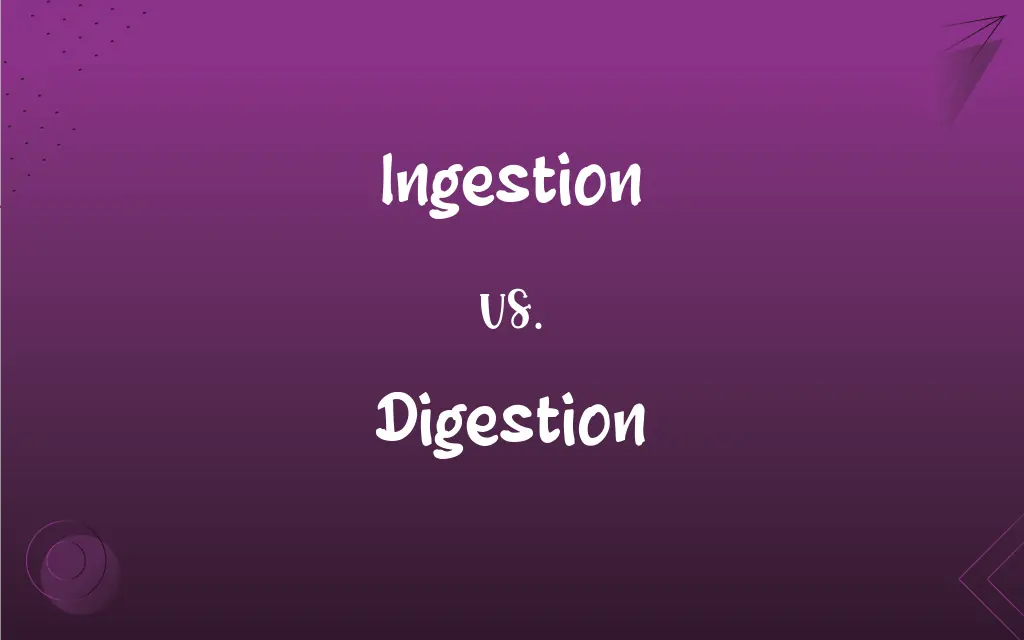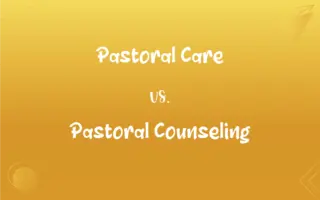Ingestion vs. Digestion: What's the Difference?
Edited by Aimie Carlson || By Janet White || Published on March 31, 2024
Ingestion is the act of taking food or drink into the body through the mouth, while digestion is the biological process of breaking down ingested food into simpler substances for absorption.

Key Differences
Ingestion refers to the process of taking food and liquids into the body through the mouth, marking the first step in the nutritional journey. It involves the act of eating or drinking. Digestion, on the other hand, is a complex process that begins in the mouth and continues through the gastrointestinal tract, involving the chemical breakdown of food into nutrients that the body can absorb.
During ingestion, the body prepares for digestion through mechanisms like chewing and saliva secretion, which start the breakdown of food. Digestion involves both mechanical actions, such as chewing and stomach churning, and chemical actions, including enzyme activity, to decompose food into absorbable substances like glucose, amino acids, and fatty acids.
Ingestion is a voluntary act that requires conscious effort to consume food and beverages. Digestion is largely an involuntary process, controlled by the nervous system and hormonal signals, which meticulously converts ingested substances into forms that can be utilized or excreted by the body.
The success of digestion heavily depends on proper ingestion. For example, thorough chewing during ingestion can significantly aid the digestion process by increasing the surface area of food, making it easier for digestive enzymes to work efficiently. Conversely, inadequate ingestion practices, such as eating too quickly, can hamper the digestion process.
Both ingestion and digestion are critical components of the human body's nutritional processes, each with distinct roles. Ingestion is the intake of nutritional substances, while digestion is the complex breakdown of these substances into forms that the body can use to sustain health, growth, and energy.
ADVERTISEMENT
Comparison Chart
Definition
Taking food/drink into the body
Breaking down food into absorbable substances
Process Type
Voluntary act of eating or drinking
Involuntary biological process
Location
Begins at the mouth
Occurs throughout the gastrointestinal tract
Mechanism
Physical act involving mouth and esophagus
Chemical and mechanical breakdown involving enzymes and digestive organs
Purpose
To introduce food and liquids into the body
To convert food into nutrients for absorption and use by the body
ADVERTISEMENT
Ingestion and Digestion Definitions
Ingestion
The process of taking in food for energy and nutrients.
Proper ingestion habits contribute to digestive health.
Digestion
The conversion of food into nutrients the body can use.
Digestion begins with saliva in the mouth.
Ingestion
The intake of substances through the mouth.
Ingestion of contaminated water can lead to illness.
Digestion
The chemical and mechanical process of food breakdown.
Proper digestion ensures the body gets necessary vitamins.
Ingestion
The act of consuming food or liquids orally.
Ingestion of a balanced diet is crucial for good health.
Digestion
The biological process of breaking down food into simpler substances.
Efficient digestion is essential for nutrient absorption.
Ingestion
The action of eating or drinking anything.
Ingestion of ample fluids is vital in hot climates.
Digestion
The process of making ingested food absorbable by the body.
Digestion of proteins yields amino acids essential for the body.
Ingestion
The first step in the process of nutrition.
The ingestion of fiber-rich foods aids in digestion.
Digestion
The breakdown of food into components small enough to cross cell membranes.
Digestion involves various enzymes and digestive juices.
Ingestion
To take into the body by the mouth for digestion or absorption.
Digestion
The process by which food is converted into substances that can be absorbed and assimilated by a living organism. In most animals it is accomplished in the digestive tract by the mechanical and enzymatic breakdown of foods into simpler chemical compounds.
Ingestion
To take in and absorb as food
"Marine ciliates ... can be observed ... ingesting other single-celled creatures and harvesting their chloroplasts" (Carol Kaesuk Yoon).
Digestion
The ability to digest food.
Ingestion
The action of ingesting, or consuming something orally, whether it be food, drink, medicine, or other substance. It is usually referred to as the first step of digestion.
Ingestion
(by extension) The act of ingesting something into a jet engine.
Ingestion
The act of taking or putting into the stomach; as, the ingestion of milk or other food.
Ingestion
The process of taking food into the body through the mouth (as by eating)
FAQs
What is ingestion?
The process of taking food and liquids into the body through the mouth.
Can digestion occur without ingestion?
No, digestion depends on the intake of substances through ingestion.
What are the main stages of digestion?
Digestion includes mechanical breakdown (chewing and churning) and chemical breakdown (enzymes and acids).
How does ingestion relate to digestion?
Ingestion is the first step that introduces food into the body, which is then broken down by digestion.
How can one improve their digestion?
By practicing better ingestion habits like chewing food thoroughly and eating slowly.
What role does the stomach play in digestion?
The stomach chemically and mechanically processes food, contributing significantly to digestion.
What is digestion?
The biological process that breaks down ingested food into simpler substances for absorption.
What factors affect the speed of digestion?
Factors include the type of food ingested, individual health, and metabolic rate.
What is mechanical digestion?
The physical breakdown of food into smaller pieces, starting with chewing during ingestion.
How long does digestion take after ingestion?
Digestion can take anywhere from 24 to 72 hours after ingestion.
Can ingestion affect one’s mood or energy levels?
Yes, the type and timing of ingestion can impact energy levels and mood.
What digestive organs are involved after ingestion?
The esophagus, stomach, intestines, and accessory organs like the liver and pancreas.
How does lifestyle affect digestion?
Lifestyle factors like diet, exercise, and stress levels can significantly impact digestion.
Can digestive efficiency change with age?
Yes, digestive efficiency may decrease with age, affecting nutrient absorption.
What is the relationship between digestion and nutrition?
Digestion allows the body to extract and absorb nutrients from ingested food.
What is the end product of digestion?
Nutrients that can be absorbed into the bloodstream and waste for excretion.
Why is water important during ingestion?
Water aids in swallowing and the overall digestion process.
How does the body regulate digestion?
Through hormones and nervous system signals that coordinate digestive activities.
What role do enzymes play in digestion?
Enzymes catalyze the chemical breakdown of food into absorbable nutrients.
Can improper ingestion lead to digestive problems?
Yes, habits like eating too fast can lead to indigestion and other digestive issues.
About Author
Written by
Janet WhiteJanet White has been an esteemed writer and blogger for Difference Wiki. Holding a Master's degree in Science and Medical Journalism from the prestigious Boston University, she has consistently demonstrated her expertise and passion for her field. When she's not immersed in her work, Janet relishes her time exercising, delving into a good book, and cherishing moments with friends and family.
Edited by
Aimie CarlsonAimie Carlson, holding a master's degree in English literature, is a fervent English language enthusiast. She lends her writing talents to Difference Wiki, a prominent website that specializes in comparisons, offering readers insightful analyses that both captivate and inform.
































































